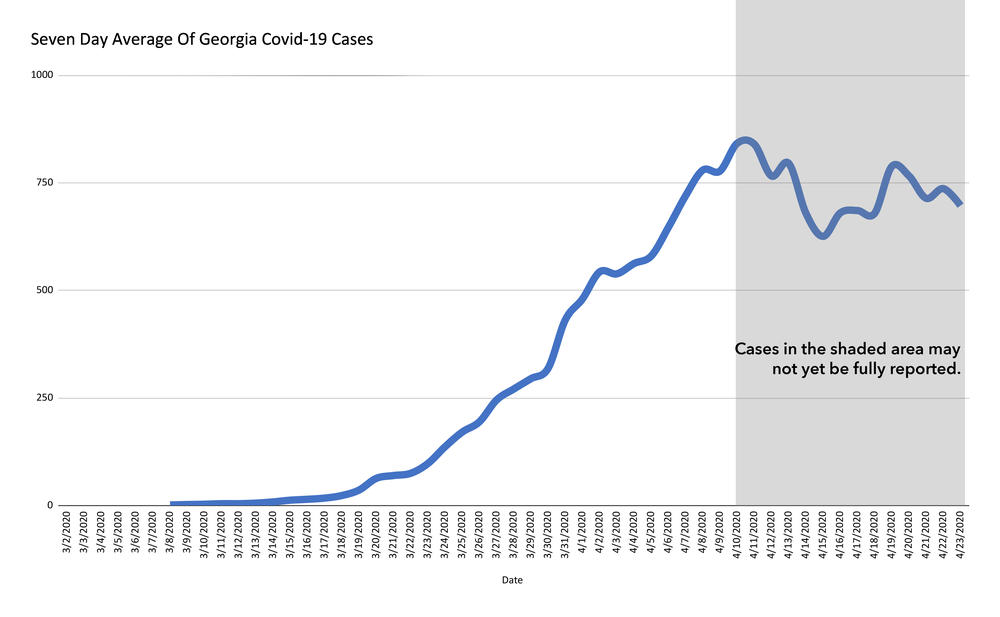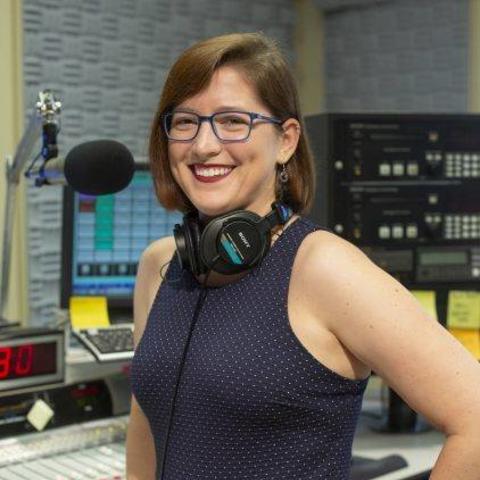Section Branding
Header Content
Balancing Safety, Bank Accounts As COVID-19 Strictures Ease
Primary Content
Macon barber Marshall Hughes, like barbers across Georgia, has been idle lately. Not so for his daughter. She’s in her second year as a nurse at the Medical Center at Navicent Health, Macon’s main hospital, where they are caring for COVID-19 patients.
“She’s had a great introduction to nursing,” Hughes joked. “Anything after this has got to be downhill.”
Hughes said he missed out on the federal aid for the barber shop he owns out in the dormant-for-now mall on the northside of town. So will he open his shop? He could use the money, but then he thinks of his daughter.
“I'm not gonna be used as a guinea pig,” Hughes said.Balancing Safety, Bank Accounts As Georgia COVID-19 Strictures Ease
The chief experiment? Cutting hair from 6 feet away.
That's because Gov. Brian Kemp said barbers, along with massage therapists, tattoo artists and exercise gyms are allowed, as of Friday April 24, to open their doors for business, with some new safety restrictions.
“We already have to be hands on with the customers we're in close proximity with the customers cutting their hair and talking with them,” Hughes said. “And to see that the numbers in Georgia have not been declining, anything like that. It's just a set up for failure, from my point of view.”
When the day came for barbers to open up, Marian Searcy was ready to go at the barber shop he helps run in downtown Macon. By just before lunch, every chair was full. So was the waiting area. Paper towels and spray bottles of disinfectant were at every work station.
"It's always smart to have a nest egg saved up, but there's nothing like working every day," Searcy said as he took clippers to the head of a customer. "Just me being a man and the stress of me being a man, to provide for my household, that's my drive for coming back to work."
Guidelines issued by President Donald Trump and the federal government spell it out: states should see 14-day declines in coronavirus cases before loosening lockdowns.
An analysis of Georgia’s numbers shows they have not dropped yet. Reporting of coronavirus cases by the Georgia Department of Public Health makes it clear that case totals are not yet even complete over that time frame, much less showing a downward trendline.
Kids Kuts salon in Marietta reopened Friday but staff was divided over whether to return to work.
"There's a few that won't come back, and there's a few that they don't have grocery money, they don't have gas money," said owner Sabra Dupree. "They need to come back. They need to work. They rely on their tips; they rely on the money that they have here."
The stylists who did return used chairs at least six feet apart, and some were booked solid Friday. Dupree removed magazines, kids' toys and other things people touch that could spread germs.
In Savannah, Strong Gym owner Mark Lebos said it would be “negligent” to reopen.
“We don’t want to be a vector for death,” Lebos said.
He said it’s true that businesses like his gym can’t really make money online like retail stores, but that doesn’t mean they should rush to open their doors.
“What we need to do to prevent ourselves from the detrimental effects of not receiving an income is not to desperately crawl our way back in too soon and do something like kill somebody,” Lebos said.
Before he closed last month, Lebos had clients sanitizing their hands and phones as soon as they got to the gym.
“And we cleaned every surface that you touched. When we did that for a good week, it's exhausting. And you go through an enormous amount of supplies doing that,” Lebos said. “And the reality is, and everybody knew it, which is we're doing the best we can, but it might not be enough.”
The city of Albany is still at the center of the southwest Georgia coronavirus outbreak that is among the densest per capita in the world. That’s where cosmetologist Regina Ellis says she’s planning on a deep disinfecting of her work place, and the salons she rents to others. Ellis and her husband are landlords for 10 other stylists around town. The coronavirus hit to their bottom line has been real.
“It's substantial,” Ellis said.
But for the Ellis family, coronavirus has been about more than their bank account.
“I have some clients that are hospitalized now. We have close friends that we just saw in January, and some are dead,” Ellis said. “I wasn't pleased with, you know, the decision to open us back up. At the end I still don't feel that we're ready.”
Ellis said she won’t be seeing clients, at least until May 15. But she said she understands the stylists that pay her rent might not have that option. The same goes for other business people.
“You know, everybody's income is not like mine. I can't tell someone else, ‘OK? I think you need to sit down,’” Ellis said. “Only thing we can do is just go with our best judgment right now and with the businesses that we house, we just want to make sure that everyone is safe and everyone takes the necessary precautions, you know?”
For Ellis and her husband, taking precautions meant being among the first in line for universal coronavirus tests for anyone in Albany when the National Guard helped make that happen earlier in the week. She broadcast the whole thing on Facebook.
“With the salons opening back up? The barber shops opening back up? All these places opening back up? I would feel rest assured to know my stylist has not tested positive for COVID-19,” she said in the video.
For Ellis, at least getting a COVID-19 test was a positive step in coronavirus recovery.



